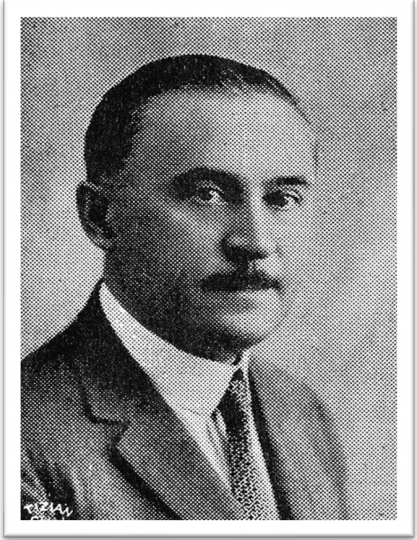Criminology in Europe: Romanian Criminology
As shown in the previous paper published in the ESC newsletter (Trandafir, 2024) criminological research has started to emerge in Romania in recent years. Looking closer at the history of this country, throughout its tumultuous past, Romanian Criminology has persisted in producing important figures that delivered significant ideas which influenced both the development of national and international Criminology.
Past concerns
The most renowned figure associated with Romanian research in the field of crime and criminal justice is probably Benjamin Mendelsohn who coined the term Victimology. A project initiated by the late Professor Leslie Sebba and by Professor Simha Landau, focusing on rescuing and digitising hundreds of documents at risk of being discarded, part of his great archive of papers, is being developed under the ESC Victimology Working Group, headed by Beatrice Coscas Williams, and will be presented during the next ESC Conference in Bucharest, hometown of Mendelsohn.

Benjamin Mendelsohn. Source: Prof. Simha Landau (picture received from Mendelsohn’s nephew)
However, several other important figures laid the groundwork for the study of Criminology in Romania. The most notable figure is Professor Traian Pop (Cluj), who delivered an extensive university course on Criminology in 1928. To this day his work is still considered fundamental to understanding the evolution of the field from a national perspective. Professor Pop greatly focused on unifying conflicting views on crime and penal policy that existed between the different regions of Romania, which only unified in 1918.
During the twentieth century, from 1938 to 1989, Romania was subjected to two different dictatorial regimes (both fascist and communist). However, independently of the inherent limitations to free thought and scientific analysis of social issues, several important authors still managed to extensively publish studies and treatises on the field of Criminology. However, often their contributions to analysing penal policy are incorporated in their works on Criminal Law in general, thus, sometimes, their standing as great criminologists is overshadowed by their achievements in the field of Criminal Law. Some notable names include Professor Nicolae T. Buzea (Iași) and Professor Vintilă Dongoroz (Bucharest), both writing extensively on questions regarding the nature of crime, criminal policy and the factors that determine criminal activity, taking into account the specifics of the political regimes that were in power at the time.

Traian Pop. Picture from Wikipedia, Source: unknown, Gazeta ilustrată, Cluj, anul III, nr. 6-7, iunie-iulie 1934, p. 94
After 1989, Criminology re-emerged as an autonomous field, alongside the newfound academic freedom to analyse any issues, independent of political agendas. The struggle of transitioning from a closed-border country with a centralised economy to an open country, with a free market, initially caused a spike in criminality in the nineties. This was juxtaposed with a court system that still applied a (quite) punitive approach, even on petty crime, which proved ineffective in fighting criminal activity, as it did not consider the underlying issues that fuelled it. Moreover, Criminal Law was still paying tribute to the centralised economy (as most thefts were against public property), providing, for instance, a penalty as high as 20 years of imprisonment for aggravated theft, even if, after 1989, such theft was punished irrespective of the ownership.
In this period (and during the beginning of the 2000s), several preeminent Romanian criminologists and Criminal Law professors published various studies that fought this type of approach to crime, showing how it only creates a breeding ground for more criminal activity, failing to properly address the factors leading to it (e.g. Cioclei, 2009). Examples of such dysfunction include penalties of 22 years of imprisonment for corruption or 30 years for first-time offenders of economic crimes. The work of these authors was “rewarded” by a fundamental change in penal policy in the 2014 Criminal Code, which drastically reduced penalties and introduced several measures focused on the reintegration of the offender.
Lowering penalties, however, was not well received for all types of crimes The Code was amended more than 35 times in the past years, and 12 of these amendments occurred only in 2023. While some changes were required by the case law of the Constitutional Court, many other changes concerned augmentations of penalties, exempting some other criminal offences (slavery, trafficking in persons, trafficking in minors, incitement to prostitution, rape and other forms of sexual abuse, torture) from the statute of limitation, or expressly forbidding suspended sentences for crimes such as negligent homicide caused by driving a vehicle under the influence of alcohol, drugs or without a driving license, as well as slavery, trafficking in persons or minors.
Current concerns – fighting sexual abuse against minors
As shown, at every stage of its evolution Romanian Criminology faced one or several core concerns, which shaped the field in its whole and future research. At the moment, the major challenge of Romanian criminologists is addressing the question of criminal offences against minors (especially sexual abuse against minors). Over the past few years, this topic has been at the centre of both the judiciary’s agenda and of public discourse; and the examples of other States which changed the legislation in this area, as well as currently existing international rules and regulations also played a role in this respect.
Moreover, the interest in uncovering systemic issues in dealing with such cases has been fuelled by several cases in which the European Court of Human Rights found fundamental deficiencies in dealing with the protection of child victims, such as M.G.C. v. Romania (no. 61495/11), C.A.S and C.S. v Romania (no. 26692/05) and I.C. v. Romania (no. 36934/08).
This led the Judicial Inspection (a structure of the Superior Council of Magistracy which monitors the activity of magistrates and courts) to investigate the leading causes generating inefficiencies in dealing with this type of cases. This led to the publishing of the 2022 Report on investigation and prosecution of sexual offences involving child victims which exposed several important statistics that helped understand the extent of the problem while also offering several potential practical solutions to help in fighting systemic issues.
The Report showed that, between February 2014 and the second semester of 2020, 18.549 cases of sexual abuse (lato sensu) have been investigated in Romania. Out of them, 3.634 led to trials with defendants, 2.279 led to dropping the charges based on their less severe nature (diversion) and in 12.636 cases charges were dropped on substantial or procedural grounds. Thus, more than two-thirds of the charges were dropped. Although, in itself, a relatively high rate of dropped charges is not concerning, since the obligation of investigating is one of means and must take into account the need to properly protect the rights of the defendant and the presumption of innocence, the Report underlines several deficiencies in understanding the reactions of victims, determining the existence or inexistence of consent, questioning the proper techniques of interviewing child victims and witnesses, and of evaluating the credibility of the victim’s testimony based on their psychological profile.
During the same period, 2.801 cases of child sexual abuse were brought to court. Out of them, 252 cases debated the issue of determining the existence or inexistence of the victim’s consent. The Report raised questions regarding the way cases are handled by courts, pointing out that there are serious risks of revictimisation during the hearings, particularly when children are interviewed. And this is mainly due to lacking infrastructure for child-friendly justice procedures and insufficient training of professionals. Furthermore, the Report underlined several concerns about the criteria used for determining the consent of minors.
These findings were highly publicised both in academia and in society at large. They raised interest especially in the field of Victimology, leading to studies concerning child victims, to better understand their reactions, their trauma and the underlying factors for higher risk of victimisation. Research in this area is still ongoing and is of immense value, since it not only relies on international studies but also considers the specifics of the social background of the victims, which sometimes can be influenced by factors inherent to the environment in which they are raised, including cultural issues.
Furthermore, there was a strong interest in correlating criminological data with the practical aspect of interviewing children and properly assessing evidence. In this field, understanding the underlying factors for abuse and the societal and psychological consequences is fundamental in minimising revictimisation and properly understanding the mental state of victims. Moreover, properly understanding the effects of the social environment on the victim can prove to be essential in properly establishing the viability of a statement.
Unfortunately, while the Report of the Judicial Inspection focused merely on data and practical solutions to the identified problems, especially on how consent is determined, the response of the State was (again) the modification of the Criminal Code by establishing that any sexual act performed by an adult with a minor under 16 years of age represents a rape. This led, in July of 2023, to numerous changes to the articles regulating sexual offences, meant to enter into force on January 1st, 2024. Reading and applying those regulations were so difficult for the legal professionals that even the legislator, on December 29th, 2023, amended the law again. The final legal provisions still raise several problems, especially in terms of the applicability of the more favourable law. So much so that the legal literature continues to debate on this topic.
Thus, currently, Romanian Criminology is at a stage where the links with the practical aspects of justice are probably the strongest. This poses great challenges, but also a great opportunity for Criminology to make a significant and immediate impact on the functioning of the justice system in its entirety. In this context, we could not be happier that the Eurocrim 2024 conference takes place in Romania, promoting a great occasion for Romanian criminologists and policymakers to discuss important issues such as the ones mentioned above.
References
Cioclei (2009). Critica rațiunii penale (Critique of Penal Reason). CH Beck.
Judicial Inspection (2022). Report on investigation and prosecution of sexual offences involving child victims, available here.
Trandafir, A.R. (2024). Criminology goes East. Balkan Criminology. ESC Newsletter issue 1/2024.

